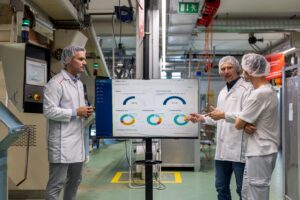Mars Wrigley has published its Cocoa for Generations report detailing the company’s advancement towards creating a modern, inclusive and sustainable cocoa supply chain. This includes 100% of its cocoa being responsibly sourced and traceable from farm from 2025.
The report details the company’s progress in 2021 and highlights its notable achievements to date. Recently, the company launched two groundbreaking programs aiming to support 14,000 smallholder farmers in the Ivory Coast and Indonesia to a sustainable living income by 2030.
The company’s progress against the goals laid out in the Cocoa for Generations includes two notable milestones: unlocking opportunities for women, which has been achieved in their collaboration with CARE, the Women for Change program has reached more than 77,000 members in cocoa farming communities . This has resulted in over US$7.4 million in savings and over US$3.7 million in loans distributed. These funds have been used in a variety of ways including cocoa farming activities, household related expenses and other income-generating activities like growing other crops.
The other milestone, tackling deforestation, aims to achieve a deforestation- and conversion-free supply chain for 100% of the cocoa it sources by 2025. Through its suppliers, Mars has distributed more than 1.9 million new non-cocoa trees in 2021. One of the efforts driving company progress is farm plot polygon mapping, which traces the perimeter of a farm rather than only one GPS point, resulting in increased traceability from the farm to the first point of purchase.
“Too many cocoa farmers continue to face a series of challenges from poverty to child labor and deforestation. The impacts of climate change and global crises are exacerbating existing vulnerabilities across cocoa farming communities and beyond,” explained Andrew Clarke, Global President at Mars Wrigley. “This is why we aim to accelerate the transformation of the cocoa supply chain so that it benefits both people and the planet. To get there, we’re working to protect children, preserve forests, and improve farmer incomes.”
“We can’t do this work alone. The shifts and the scale to reach sustained, demonstrable improvements for cocoa farming families and their communities requires thinking and collaborating in new ways. We are working to transform the cocoa ecosystem, and while we’ve made important progress to-date, we’re not done yet,” said Amber Johnson, Vice President at Mars Wrigley Cocoa.
Stay up-to-date on the latest industry news and developments in our magazine.
Never miss a story… Follow us on:
![]() International Confectionery
International Confectionery
![]() @InConfectionery
@InConfectionery
![]() @InConfectionery
@InConfectionery
Media contact
Caitlin Gittins
Editor, International Confectionery
Tel: +44 (0) 1622 823 920
Email: [email protected]








